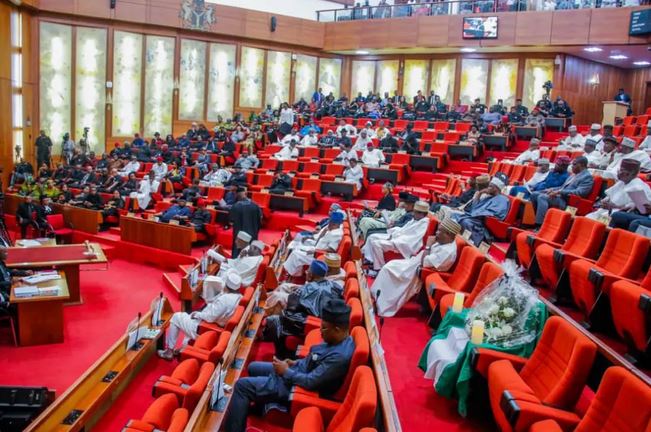Nigerians Earning Below N1m A Year Won’t Be Taxed In Tinubu‘s Proposed Tax Reform Bill
Posted by Samuel on Thu 28th Nov, 2024 - tori.ngThe Nigerian Senate is poised to pass the controversial Tax Reform Bills today, which include a provision exempting individuals earning less than N1 million annually from taxation.
This comes after the Federal Government’s tax executives including the Director-General, Budget Office, Tanimu Yakubu; the Executive Chairman, Federal Inland Revenue Service, FIRS, Zacch Adedeji; and the Chairman, Presidential Committee on Fiscal Policy and Tax Reforms, Mr Taiwo Oyedele on Wednesday, November 27 explained to senators the benefits of the tax bill to the Nigerian economy if passed into law .
The tax executives said that the bills were to tax prosperity and not poverty and that those earning less than One Million Naira a year would be exempted from income tax.
During Wednesday’s plenary session, Deputy President of the Senate, Senator Barau Jibrin (APC, Kano North) said that debate on the tax bills will continue on Thursday.
In his presentation, Taiwo Oyedele said the reform was not planned to tax poverty but prosperity and most importantly, to “correct lopsided tax gain derivation.”
He said: “The committee proposes four major bills aimed at overhauling the tax system. The Nigerian Tax Bill seeks to harmonize major taxes into one legislation, simplifies tax processes, and proposes exemptions for low-income earners.
“The Tax Administration Bill aims at establishing standards for tax administration, promotes the use of technology, and aims to streamline tax collection.
“Nigerian Revenue Service Establishment Bill proposes the establishment of a new revenue service to improve tax collection and coordination among agencies while the Joint Revenue Board Establishment Bill aims to enhance collaboration among tax authorities and create a Tax Ombudsman to protect small businesses.
“Key proposals of the tax reform bills are elimination of minimum tax for loss-making companies; Introduction of a 15% effective tax rate on profits for large companies; removal of VAT on essential goods and services; and increased tax thresholds for personal income tax to exempt low-income earners.”
“The current VAT sharing formula is deemed unfair, favouring states with major corporate headquarters. The proposal includes a more equitable distribution based on consumption within states as against current sharing formula which lopsidedly favours Lagos State, being host to headquarters of corporate organizations.”
“Today, we are taxing people that earn N30,000 a month. That’s N1,000 a day. How can anybody survive earning N30,000 a month? Even if they live alone, they will do transport, they will buy food, they will pay rent, they will pay for electricity. They cannot survive. So we are proposing in the bill before you that anybody earning N800,000 naira a year, including an extra N200,000 for rent, about N1 million a year, should not pay personal income tax. By the way, this threshold is not even the highest in Africa. It’s still lower than many small African countries,” he said.
In conclusion , the team told the federal lawmakers that the tax reform bills are four different pieces of legislation that seek to bring everything about taxation and administration of tax in Nigeria under four different pieces of legislation.
The bills are the Nigeria Tax Bill; the Nigeria Tax Administration Bill; the Nigeria Revenue Service Establishment Bill and the Joint Revenue Board Establishment Bill.
Recall that on September 3, 2024, President Tinubu transmitted four tax reform bills to the National Assembly for consideration, following the recommendations of the Presidential Committee on Fiscal and Tax Reforms headed by Taiwo Oyedele for the review of existing tax laws.






















































